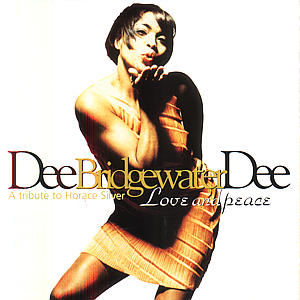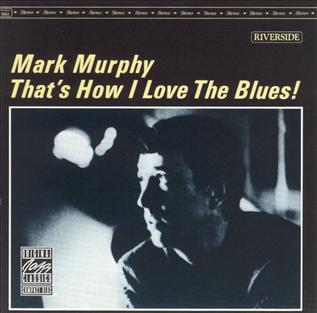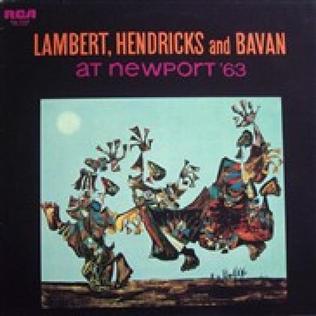Related Research Articles

Horace Ward Martin Tavares Silver was an American jazz pianist, composer, and arranger, particularly in the hard bop style that he helped pioneer in the 1950s.

John Carl Hendricks, known professionally as Jon Hendricks, was an American jazz lyricist and singer. He is one of the originators of vocalese, which adds lyrics to existing instrumental songs and replaces many instruments with vocalists, such as the big-band arrangements of Duke Ellington and Count Basie. He is considered one of the best practitioners of scat singing, which involves vocal jazz soloing. Jazz critic and historian Leonard Feather called him the "Poet Laureate of Jazz", while Time dubbed him the "James Joyce of Jive". Al Jarreau called him "pound-for-pound the best jazz singer on the planet—maybe that's ever been".
Lambert, Hendricks & Ross were an American vocalese trio formed by jazz vocalists Dave Lambert, Jon Hendricks and Annie Ross. From 1962 to 1964, Ross was replaced by vocalist Yolande Bavan.

Moanin' is a jazz album by Art Blakey and the Jazz Messengers recorded in 1958 for the Blue Note label and released in 1959.

Love and Peace: A Tribute to Horace Silver is a 1995 studio album by Dee Dee Bridgewater, recorded in tribute to Horace Silver.
Yolande Bavan is a Sri Lankan singer and actress.
Hermenengildo "Gildo" Mahones was an American jazz pianist.

The Best of Ray Charles is a compilation album released in 1970 on the Atlantic Jazz label, featuring previously released instrumental (non-vocal) tracks recorded by Ray Charles between November 1956 and November 1958.

Sing a Song of Basie is a 1958 album by Lambert, Hendricks & Ross.

Havin' a Ball at the Village Gate is the last album by the reformed jazz vocal group Lambert, Hendricks & Bavan, of Dave Lambert and Jon Hendricks with Yolande Bavan. The group was formed after Annie Ross left the vocal group in 1962. The album was recorded live at the Village Gate club in New York City on December 20 and 21, 1963.
"Four" is a 1954 jazz standard. It was first recorded in 1954 by jazz trumpeter Miles Davis and released on his album Miles Davis Quartet. It is a 32-bar ABAC form.

That's How I Love the Blues! is an album by American jazz vocalist Mark Murphy featuring tracks recorded in late 1962 for the Riverside label.
"Moanin'" is a composition by Bobby Timmons, first recorded by Art Blakey's band the Jazz Messengers for the album of the same title that was released by Blue Note Records.
"Hi-Fly" is one of the best known compositions by pianist Randy Weston, written in the 1950s and inspired by his experience of being 6 feet 8 inches tall, "and how the ground looks different to you than everybody else". Since first being recorded on 1958's New Faces at Newport, "Hi-Fly" appears on several other albums by Weston, including Live at the Five Spot (1959), Niles Littlebig (1969), Tanjah (1973), Perspective, Rhythms and Sounds (1978), Earth Birth (1995), Zep Tepi (2005), and The Storyteller (2009).
"The Preacher" is a composition by Horace Silver. The original version was recorded by Silver's quintet on February 6, 1955. It was soon covered by other musicians, including with lyrics added by Babs Gonzales. It has become a jazz standard.

At Newport '63 is an album by the jazz vocalese group Lambert, Hendricks & Bavan recorded at the 1963 Newport Jazz Festival. The album features the group who had re-formed in 1963 featuring Dave Lambert and Jon Hendricks, with Yolande Bavan replacing Annie Ross who had left the group in 1962.
Recorded "Live" at Basin Street East is an album by the jazz vocalese group Lambert, Hendricks & Bavan recorded at the New York City nightclub Basin Street East. The album features the group who had re-formed in 1963 featuring Dave Lambert and Jon Hendricks, with Yolande Bavan replacing Annie Ross who had left the group in 1962.

Quincy's Home Again is an album by Quincy Jones with performances by Harry Arnold's Orchestra. The album was recorded in Sweden in 1958 and released by Metronome label. The album was also released in the U.S. as Harry Arnold + Big Band + Quincy Jones = Jazz! by EmArcy.

Sing Along with Basie is an album by vocalese jazz group Lambert, Hendricks & Ross with Joe Williams and the Count Basie Orchestra recorded in 1958 and originally released on the Roulette label.
"Señor Blues" is a composition by Horace Silver. The original version, an instrumental by Silver's quintet, was recorded on November 10, 1956. It has become a jazz standard. Silver later wrote lyrics, which were first recorded by Silver's band with Bill Henderson singing in 1958.
References
- ↑ Yanow, Scott (2003) Jazz on Record – The First Sixty Years. Backbeat. p. 363.
- 1 2 Cook, Richard (2004), Blue Note Records – The Biography. Justin, Charles & Co., p. 73.
- ↑ Kirchner, Bill, "Horace Silver: Doodlin'" Archived March 4, 2016, at the Wayback Machine . jazz.com Retrieved September 13, 2015.
- 1 2 Rosenthal, David H. (1993), Hard Bop: Jazz and Black Music, 1955–1965. Oxford University Press, p. 38.
- ↑ "Horace Silver / Horace Silver & the Jazz Messengers – Horace Silver and the Jazz Messengers". AllMusic. Retrieved September 13, 2015.
- ↑ Yanow, Scott "Ray Charles – The Great Ray Charles". AllMusic. Retrieved September 13, 2015.
- 1 2 Yanow, Scott "Lambert, Hendricks & Bavan – Live at Basin Street East". AllMusic. Retrieved September 13, 2015.
- ↑ Hajdu, David (July 1, 2011), "Hendricks and Ross: Doodlin' Again", New Republic.